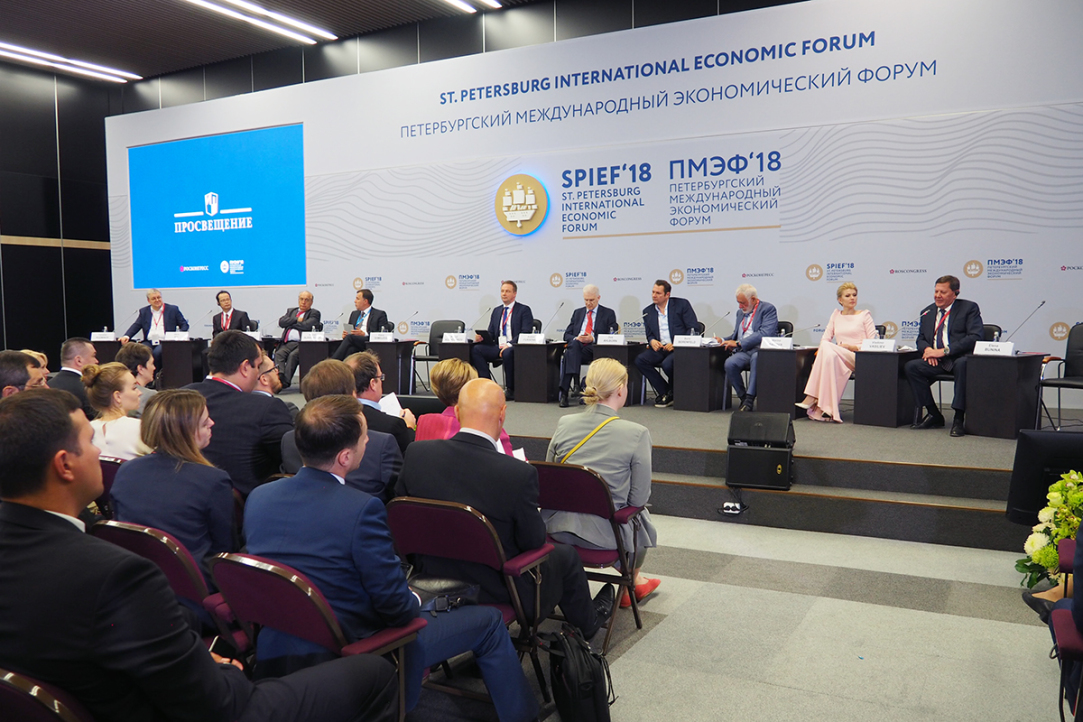Families and Private Investors Ready to Invest in Education

Households and businesses in Russia are ready to invest in education, but this potential is not fully realized. The participants of the panel discussion ‘The Future of the Economy: Education as an Area of Investment’ that took place on May 25 at the St. Petersburg International Economic Forum discussed why this happens.
HSE Rector Yaroslav Kuzminov, who moderated the session, reminded the audience that Russia is far from being a leader in public investment in education. At its peak, Russia spent 4% of GDP on education, and today, this amount has fallen to 3.5%. It is lower than in the countries that Russia competes with, and, seemingly, this shortage should be compensated with private investment.
But speaking about investment in basic education, there is a problem of social inequality. Even minor social stratification is unacceptable, that’s why the opportunities to attract families’ funds are limited, Yaroslav Kuzminov emphasized. Schools shape the country’s human capital for years to come, and it is not families that should invest in basic education development, but businesses. Meanwhile, business participation in this sector is not yet typical for Russia.
The situation is different at the next levels of education: for each rouble invested by the country, families and companies invest another rouble. This is a good ratio and it shouldn’t be changed substantially, the HSE Rector believes. At the same time, despite it clearly being in their interest, businesses don’t invest in vocational training and education of skilled workers.
In December 2016, the Higher School of Economics analyzed the population’s readiness to invest in the social sphere. The results exceeded all expectations: 41% of citizens declared that they were ready to invest 5-15% of their income in education (the indicators in the U.S. are similar). In 2018, the share of such citizens fell to 38%, with a growing share of those ready to invest up to 15% of their incomes, which means giving up many other outgoings for this.
The discussion involved MSU Rector Viktor Sadovnichy and ITMO Rector Vladimir Vasiliev, who shared their experiences of creating R&D centres with business participation at their respective universities. Mikhail Alashkevich, VEB Vice President, suggested that the state should return businesses’ investment in education only if visible results are achieved (for example, an investor invests in a school, but gets the investment back if it quantifiably helps to decrease the number of underachieving students in the school).
Andrey Fursenko, Russian Presidential Aide, suggested that lack of money is not the main problem in education, and recommended investing not only in infrastructure and technology, but also in knowledge and human capital. Mikhail Kozhevnikov, First Vice President of Prosveshcheniye Group of Companies, said that his company is ready to invest in education, but needs clear state guarantees.
Yaroslav Kuzminov closed the session noting that both individuals and businesses are ready to invest in education, and one of the reasons for this is that they are ready to spend their resources on something important. A key factor in the process of fund raising should be not only money, but changes in the contents of education, which would lead, for example, to a rapid decrease of underachieving school students (currently this is 28% of pupils). Investment should be made not just in innovations, but in things that are necessary and will definitely increase the quality of education.
See also:
HSE, MGSU and Prosveshcheniye to Develop New Schools Together
On May 24, at the St. Petersburg International Economic Forum, top executives from HSE, the Moscow State University of Civil Engineering (MGSU), and Prosveshcheniye Education Holding signed a cooperation agreement. As part of it, the two national research universities and Russia’s largest manufacturer of teaching and learning aids and services will suggest optimal spatial solutions for school buildings.
Yaroslav Kuzminov: ‘Russia is on the Threshold of a Revolution in Higher Education’
At a panel session ‘Plan of Action to Improve Higher Education in Russia’ at the St. Petersburg International Economic Forum, the heads of leading Russian universities, HSE Rector Yaroslav Kuzminov among them, and foreign experts discussed how to bring Russian universities to a new level.
Public Observers at USE must have a Wider View
On November 18, 2013, Yaroslav Kuzminov, Head of the Russian Public Chamber Commission for Education Development, took part in the all-Russian forum ‘Public Observations of the Unified State Examination (USE) in 2014’. The forum looked at how procedures for the USE could be improved.


